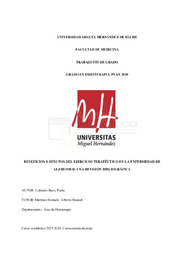Please use this identifier to cite or link to this item:
https://hdl.handle.net/11000/33530Full metadata record
| DC Field | Value | Language |
|---|---|---|
| dc.contributor.advisor | Martínez Hurtado, Alberto Manuel | - |
| dc.contributor.author | Calderón Baos, Paula | - |
| dc.contributor.other | Departamentos de la UMH::Patología y Cirugía | es_ES |
| dc.date.accessioned | 2024-10-16T12:13:37Z | - |
| dc.date.available | 2024-10-16T12:13:37Z | - |
| dc.date.created | 2024-05-28 | - |
| dc.identifier.uri | https://hdl.handle.net/11000/33530 | - |
| dc.description.abstract | Introducción: El aumento de la esperanza de vida lleva consigo el aumento de las personas con la Enfermedad de Alzheimer (EA). Por lo que es necesario buscar tratamientos no farmacológicos que consigan retrasar el desarrollo de la enfermedad. El tratamiento con ejercicio terapéutico ejercido por fisioterapeutas, tiene cada vez más evidencia para este tipo de enfermedad. Objetivos: Revisar a través de los artículos científicos los beneficios y efectos del ejercicio terapéutico/físico en personas con EA. Material y métodos: Se realizó una búsqueda bibliográfica en diferentes bases de datos (PubMed, PEDro y Scopus) con las palabras “Alzheimer” y “Exercise Therapeutic” unidas por el operador boleano AND. Se aplicaron criterios de inclusión y exclusión, obteniendo así un total de 16 artículos seleccionados tras filtrar los 787 obtenidos inicialmente. Resultados: Respecto a los resultados obtenidos de los 16 artículos seleccionados, en todos se obtuvo resultados positivos acerca de que el ejercicio terapéutico era beneficioso para las personas con EA como una terapia no farmacológica frente a las farmacológicas. A todos los artículos finalmente seleccionados se les paso la escala PEDro para poder evaluar así su calidad. Conclusión: Se encontró evidencia sobre los beneficios del ejercicio terapéutico para mejorar la fuerza, la cognición, la memoria, la función ejecutiva y disminuir el riesgo de caídas principalmente. Aplicado por parte de fisioterapeutas de manera segura. | es_ES |
| dc.description.abstract | Introduction: The increase in life expectancy brings with an increase in people with Alzheimer’s Disease (AD). Therefore, it’s necessaty to look for non-pharmacological treatments that can delay the development of the disease. Treatment with therapeutic exercise performed by physsiotherapists has increasing evidence fot this type of disease. Objectives: Review through scientific articles the benefits and effects of therapeutic/physical exercise in people with AD. Material and methods: A bibliographic search was carried out in different databases (PubMed, PEDro and Scopus) with the words “Alzheimer” and “Exercise Therapeutic” joined by the Boolean operator AND. Inclusion and exclusion criteria were applied, obtaining a total of 16 articles selected after filtering the 787 initially obtained. Results: Regarding the results obtained from the 16 selected articles, in all of them positive results were obtained that therapeutic exercise was beneficial for people with AD as a non-pharmacological therapy compared to pharmacological ones. All the articles finally selected were passed the PEDro scale in orden to evaluate their quality. Conclusión: Evidence was found on the benefits of therapeutic exercise to improve strength, cognition, memory, executive function and mainly reduce the risk of falls. Applied safely by physiotherapists. | es_ES |
| dc.format | application/pdf | es_ES |
| dc.format.extent | 31 | es_ES |
| dc.language.iso | spa | es_ES |
| dc.publisher | Universidad Miguel Hernández | es_ES |
| dc.rights | info:eu-repo/semantics/openAccess | es_ES |
| dc.rights.uri | http://creativecommons.org/licenses/by-nc-nd/4.0/ | * |
| dc.subject | ejercicio | es_ES |
| dc.subject | enfermedad de Alzheimer | es_ES |
| dc.subject.other | CDU::6 - Ciencias aplicadas | es_ES |
| dc.title | Beneficios y efectos del ejercicio terapéutico en la enfermedad de Alzheimer: una revisión bibliográfica | es_ES |
| dc.type | info:eu-repo/semantics/bachelorThesis | es_ES |

View/Open:
TFG CALDERÓN 1 BAOS 2, PAULA.pdf
1,02 MB
Adobe PDF
Share:
.png)
